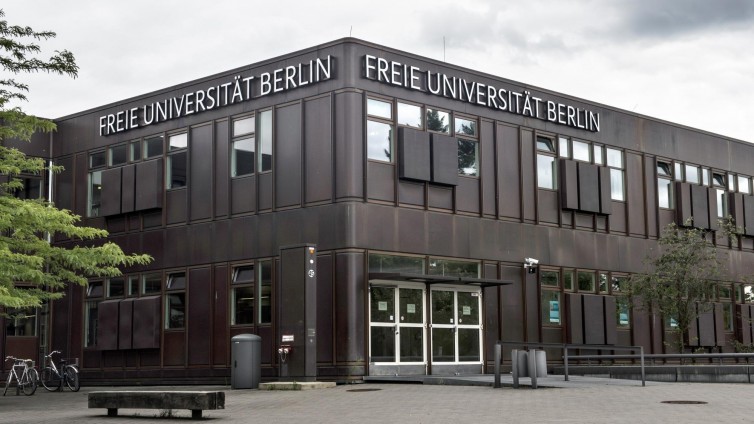
Scottish writer Nancy Campbell will hold the Samuel Fischer Visiting Professorship at the Peter Szondi Institute of Comparative Literature, Freie Universität Berlin, this summer semester. She will be teaching a seminar titled “On Water and Other Voices,” which will focus on the importance of water in our somatic experience of environments. Her inaugural lecture, “Hot Metal Frozen Paper,” will take place on May 4, 2023.
Campbell uses a number of creative and innovative methods to explore the consequences of climate change in her literary work. She is particularly interested in marginalized and endangered languages, as they trace the relationship between the speaker and the ecology of the landscape they inhabit. Her first book, How to Say “I Love You” in Greenlandic (2011), blends an introduction to Greenland’s evocative and mutable topography with the typography that charts the language, while the poetry collection Disko Bay (2015) explores the impact of climate change on the Arctic region. The Library of Ice (2018) is dedicated to putting Campbell’s fascination with the stark, rugged beauty of ice into words, and considering the environment as an archive. The collection Fifty Words for Snow (2020) covers the alphabet from “avalanche” (French) to “zud” (Mongolian), serving as a compendium of winter words from across the world.
Campbell’s seminar, “On Water and Other Voices,” will shine a light on the significance of water in how we experience environments on a somatic level. Campbell will take the radical and ceaseless water cycle as a starting point from which to embark on an examination of ecopoetics and book arts, asking how the writer navigates the flow of deep time and the elements in an era of global climate crisis. These sessions will treat the field of literature broadly, including non-Western, non-canonical poetries, from ancient and autochthonous cultures, and more-than-human voices (for example, tides, ice cores, mycelia) with a strong focus on the polar regions. Campbell will examine how tensions between oral literatures and the history of the book might prompt pragmatic and provocative new approaches to deciphering other voices. Students will be encouraged to probe the limits of textual expression by investigating linguistic anomalies, neologisms, and disappearances – including endangered languages, asemic texts, and aphasia – and the history of cultural records.
Nancy Campbell was born in 1978 and grew up in the “debatable lands” of Northumberland and the Scottish Borders. She currently lives in a 1984 Buccaneer caravan in woodland outside Oxford, UK, a location that forms the setting of her recent memoir, Thunderstone. Having completed her university studies in English at Oxford between 1996 and 1999, she trained in the craft of letterpress printing, working at studios for art books in North America and UK and collaborating with artists such as Sarah Bodman and Roni Gross. Collaboration continues to be a central part of her practice, most recently with Julie Johnstone (Grass of Parnassus, 2023). She conducted several independent trips to research stations in the Arctic between 2010 and 2017.
In 2020 she received the prestigious Ness Award from the Royal Geographic Society for her diverse body of work on the physical environment, which includes non-fiction works The Library of Ice (2018) and Fifty Words for Snow (2020), the poetry collection Disko Bay (2015), and artist’s books How to Say “I Love you” in Greenlandic (2011) and Vantar|Missing (2014). Disko Bay was also nominated for the 2016 Forward Prize for Best First Collection and the 2017 Michael Murphy Memorial Prize. Last year she published her memoir Thunderstone, which details her experience of living off-grid in the wake of Covid-19 lockdowns, and a new poetry collection, Uneasy Pieces.


